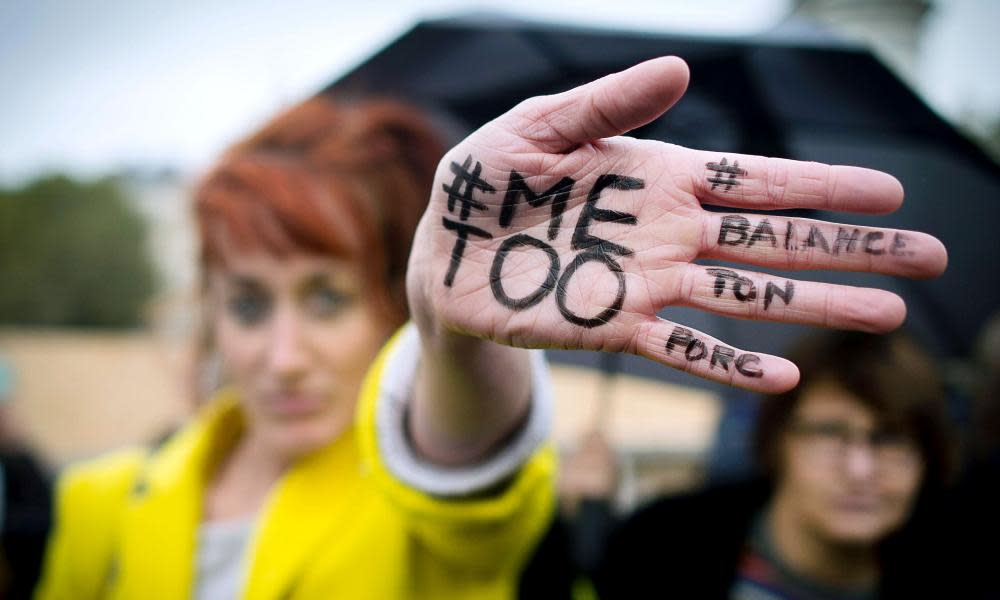#MeToo a revolution that can't be stopped, says Time's Up co-founder

#MeToo and Time’s Up constitute a revolution in women’s rights that is too powerful to be turned back, says the New York attorney Roberta Kaplan, the co-founder of the Time’s Up Legal Defense Fund.
Lawsuits and law changes at state level show the related campaigns against sexual misconduct are still strengthening, Kaplan said, in an interview marking a year since #MeToo went viral.
The legal defense fund backs action against sexual misconduct, especially involving the abuse of power at work. Kaplan said more than $20m has been raised.
The fund is fronted by some of the biggest names in Hollywood but it chiefly pays for lawyers to fight cases brought by low-paid workers. Kaplan said the movement as a whole is encouraging thousands of women to “come out” as victims of misconduct, gaining strength in numbers as the movement for gay rights did in the 1970s and 80s.
“I think it’s revolutionary,” Kaplan said. “And it’s not going to go back. I can’t see women agreeing to return to the days of isolation and shame.”
This month, Donald Trump and other Republicans attacked Dr Christine Blasey Ford over her allegation of sexual assault by Brett Kavanaugh, the president’s supreme court nominee. Kavanaugh was duly confirmed and the president has continued to publicly insult or attempt to silence women who cross him.
It’s a tribute to the progress that’s happened. No-one should give up – because we are in the midst of a revolution
Roberta Kaplan
Such cases may have left many women disheartened or exhausted, Kaplan said. But she added that they count merely as a backlash, not a reversal of this feminist wave.
“It’s a tribute to the progress that’s happened,” she said. “It’s really a backhanded compliment to how much things have changed and no-one should give up – because we are in the midst of a revolution.”
#MeToo was created by Tarana Burke 13 years ago, as a fellowship signal to survivors of sexual violence. But it emerged afresh on social media in 2017 and took off as allegations from multiple women against the movie mogul Harvey Weinstein led to his arrest and trial. That case opened the floodgates to complaints about assault and harassment in all corners of society.
A-list celebrities such as Meryl Streep, Jessica Chastain, Julianne Moore, Kerry Washington, America Ferrera, Michelle Williams and Amy Schumer began meeting with activists and industry leaders in Los Angeles and New York. They helped create Time’s Up, aiming to rewrite laws and employment regulations and to boost workplace training and protections. They also set up the legal defense fund.
“They were using their incredible reach to get the message out,” said Kaplan. “People like Reese Witherspoon and Natalie Portman were turning up in jeans, no entourage, no fanfare, to meet with young activists, campaigners from Black Lives Matter, Gloria Steinem, Shonda Rhimes and fuddy-duddy nerdballs like me, and they were writing letters and making phone calls just like staff at a nonprofit.”
More than 780 attorneys have now signed up, 50 cases are under way and $22m has been raised, under the administration of the National Women’s Law Center (NWLC). According to the NWLC, around 40% of those seeking assistance are women of color and 65% are low-income. They come from employment sectors ranging from construction to food services to the military.
“We’ve helped people bring cases they couldn’t have brought otherwise,” said NWLC president Fatima Goss Graves. “We can make it a reality that no matter where you work, you can do so safely and with dignity.”
One pending case involves a single mother working as a retail cashier at a dollar store in New York whose general manager allegedly cut her hours drastically after she spurned his advances. A group of paramedics in the Chicago fire department, meanwhile, allege they were harassed by co-workers and superiors who operated a “code of silence” to protect an abusive culture.
Kaplan is best known for representing the late Edie Windsor in a landmark supreme court case that in 2013 struck down the Defense of Marriage Act, paving the way for legal same-sex marriage.
Now leading her own firm, she spoke to the Guardian in its offices high in the Empire State Building, in New York City. She hailed changes made in the last year by industries and state governments, but called for such work to expand.
Eleven states and two cities – among them California, Maryland, Vermont, Illinois, Arizona and New York City – have stepped up legislative action to ban workplace non-disclosure agreements which, Kaplan said, “isolate” and deter complainants. They are also seeking to prohibit enforced arbitration and mandate anti-discrimination training, according to the NWLC, which like Kaplan urges further change.
Kaplan pointed to a lack of legislation from Congress but said she hopes that will change, with “the groundswell of enthusiasm from voters to address these issues”, if Democrats win convincingly in the midterms. Time’s Up also plans to step up both its outreach to women and its pressure on corporations and politicians.
“We’re only at the tip of the iceberg,” she said.
The Associated Press contributed to this report

 Yahoo News
Yahoo News 
